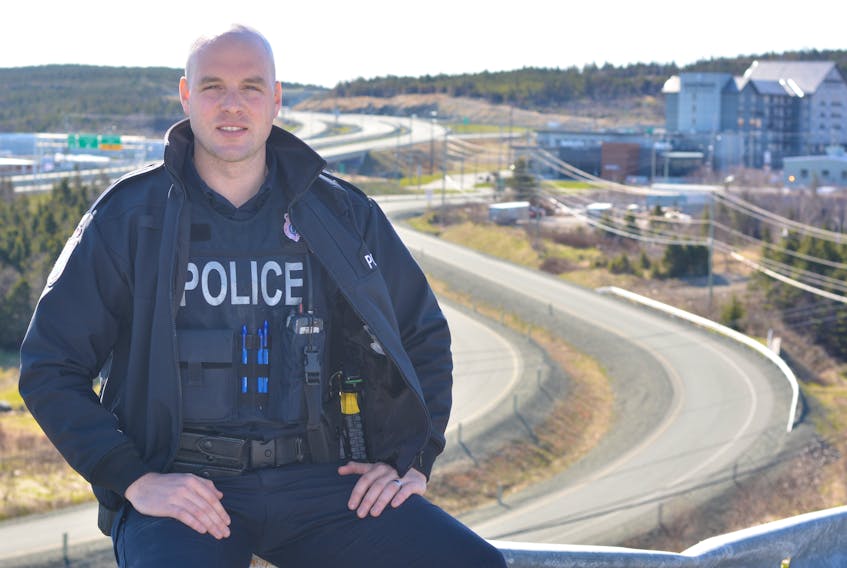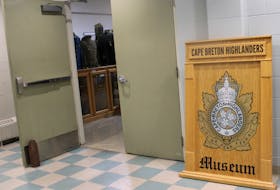ST. JOHN'S — In the early days of the COVID-19 lockdown, chaotic Kenmount Road was suddenly still — other than a police cruiser and city truck — a telling thing for Const. Dan Cadigan that the routines of the world as we knew it had been upended.
“Driving down Kenmount Road at any time of the day, it’s vehicles and people and businesses, and I remember one dayshift the middle of the day and … there was not a single car, or person or place, anything moving out there,” recalled Cadigan, an eight-year street patrol officer with the Royal Newfoundland Constabulary currently based out of the Mount Pearl station.
Police officers used to sharing stories and experiences from one shift to another were suddenly in another sphere.
“That first day was such an eerie, eerie, eerie feeling. … ‘Get in your cars, try to limit your contact with people and here’s your (personal protective equipment)’ … and just driving up and down the street and nobody in sight, it was such an uneasy feeling for us,” said Cadigan, who is also a member of the RNC's tactical team.
“Just having a day where you’re not knowing where everyone is and what is going on and nobody wanted you around. That was just a day of, ’What is happening in this world?’”

As time has gone on with the new normal setting in, daily reports of no new COVID-19 cases in a rhythm and some of the restrictions eased, there’s a little more ability to chat with colleagues at a distance. Traffic has ramped up as closures and public anxiety have eased.
“From then to now has changed a lot. Policing has definitely changed as a result of COVID, the way business is handled and using technology as a tool for us moreso,” Cadigan said of such things as online reporting being a good help.
Obviously, they can’t social distance when making an arrest. Some suspects have told police they have COVID-19, which leads to a flurry of testing, anxiety and self-isolating. Whether the arrestee is being truthful or not, precautions must be taken.
Cadigan said he, fortunately, has not had to get tested, but others have not been so lucky, having to separate from their families to go isolate.
Many officers keep their uniforms and other work belongings at the station so they don’t risk bringing home infection to their bubbles. Dirty clothes are secured at home in a garbage bag and washed immediately.

Days begin with parade, during which the sergeant in charge lets officers know what’s going on out on the streets and assignments for the day.
But since the COVID-19 pandemic began, they gather with everyone separated in the room and the whole area is wiped down with disinfectant beforehand and afterward.
“Since COVID, most people just get in police cars and … you don’t see each other until the end of shift when you bring your vehicle back because people just don’t want to come in and potentially contaminate themselves or someone else,” Cadigan said.
Each officer disinfects their vehicle at the end of the shift and the next officer goes through the same process before the start of their shift.
“When it first came on, being an island, everybody was of the mindset that it would be fine and no one understood the totality of the whole situation. As it unfolded and we started seeing the effects it had on different parts of the world, our organization tried to get ahead of it the best they could,” Cadigan said.
“Even showing up to work we would normally come in and have a conversation with people who were relieving from night or day shift, but we try and not even have that anymore, just to not have any contamination between officers. That is a little bit of an adjustment. … It sucks for that side of it, just the camaraderie you lose out on.”

He said the RNC COVID-19 team is doing a good job of making sure the officers have what they need, but the reality is nobody has dealt with this situation before.
Officers are on standby if someone has to be sent home due to threat of contamination, which has helped ease the anxiety.
Even with the lull in COVID-19 cases in the province, there is the uncertainty surrounding a potential second wave, especially as quarantine fatigue sets in with the weather warming up and people become less vigilant about social distancing in public or shrug off the need to be tested if they have symptoms.
”Everyone’s fear is bringing it home from work and potentially coming home to our families,” said Cadigan, whose mother lives with him and his wife.
“Everything stays in the office. Nobody brings anything home anymore.”

At the police stations, the rooms where they store things like handcuffs and guns are entered one person at a time.
As some people are not comfortable having officers or anyone else in their home, tools such as email and phones for interacting where possible have been ideal in helping maintain social distancing.
“A lot of people just don’t feel comfortable with us in their home because we are out in public,” he said.
“I went in one home, a lady asked me to come in — and I was required to based on the circumstances around the call — so as I was coming in the lady was wiping down her table, her chairs, her doorknobs and everything with Lysol as I was coming in and disinfected a whole area for me to sit down and take a statement. And as I was leaving, she disinfected the whole thing again and as I was going out the door, disinfected the door behind me. ... Everyone is just doing what they think is the right thing.”
Officers have also had to respond to situations of non-compliance with COVID-19 restrictions.
“A lot of people just don’t feel comfortable with us in their home because we are out in public.” — Const. Dan Cadigan.
“The fact is some people, I guess, just never really took it seriously,” Cadigan said. “Some of the public just kind of went on about life as normal, while other people taking it seriously didn’t appreciate that and would call in to us. We had to try to deal with it as best we could, moreso educate the people on what is required of them. … Some people don't have the means to be updated every day on what is going on or how they are supposed to be reacting."
For the most part, breaking up parties was without incident.
“Everybody is pretty reasonable. … They just want to see their friends and families,” said Cadigan, who understands, not being able to see his own extended family as well as friends.
“It can take a toll on you. … It’s human nature to want to be with friends and family and share a pint and a laugh and a song.”
That said, it’s like a domino effect if one person sees another ditching the rules, so they have to get that point across.
“The main thing is keeping everyone as safe and healthy as we can,” Cadigan said.
Our RNC Covid-19 Emergency Response Team would like to thank the @nlliquor for providing our frontline officers with the generous donation of over 500 bottles of hand sanitizer. Thank you for helping us to #FlattenTheCurve. #Covid19NL #MadeRightHere #StayHome #WashYourHands pic.twitter.com/nqq3XJ9Ou6
— Royal Newfoundland Constabulary (@RNC_PoliceNL) May 6, 2020
On a personal level, he said he’ll never take for granted again, once it returns, the ability to go out with the boys, to dine out with family and friends.
With early uncertainty, there was economic and societal fear, as no one knew what would happen next.
“It is a scary time for everyone — where is this going to go, when is it going to end. … You can’t plan. I am a bit of a planner,” Cadigan said.
“You feel for people trying to get married, you feel for people who are having to postpone their weddings for two, three years down the road just to try to stay away from COVID.
“From the policing side of it, trying to plan for what is coming next, you really can’t because you don’t know.”
During the crisis, a horrific tragedy also shook first responders — the mass killing of 22 victims in Nova Scotia, which included RCMP Const. Heidi Stevenson being slain in the line of duty.
“You train for it, but when the time comes it just seems so surreal that that would occur. … It affects you seeing that happen to someone and their family. … The reality of it’s not just going to work,” said Cadigan, who penned a song in Stevenson’s honour.
The dangers of policing resonated for his family, which includes his brother, Const. James Cadigan.
“Somebody like Heidi puts her life on the line to protect the residents of her community. It definitely hit home here in our province and police force,” Cadigan said.
During the COVID-19 pandemic, the routine practicalities of police have also changed — officers are always expected to maintain a certain level of clean-cut grooming. Cadigan shaved his head, while colleagues went online to order clippers.
Little things like picking up a quick bite to eat while on patrol are no longer as simple, as are the ability to use a public washroom while on patrol rather than having to go back to the station.
But the unity of first responders has shone through, as at a scene, if someone doesn't have personal protective equipment, the responders share any spares they may have.
“Trying to work together to keep us all safe is just so important,” Cadigan said.
Twitter: @BarbSweetTweets









